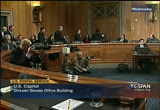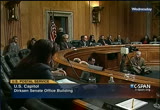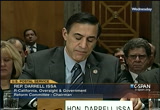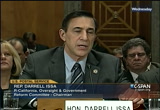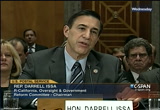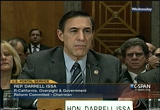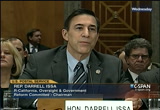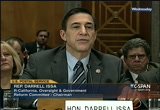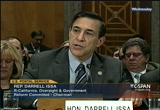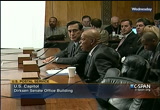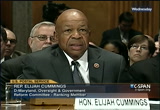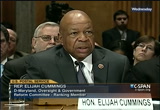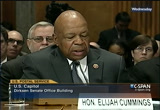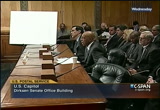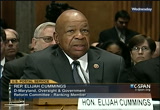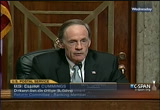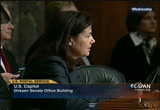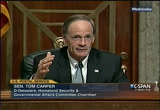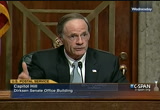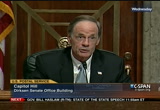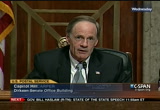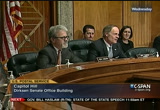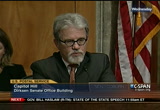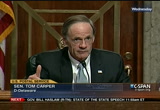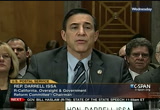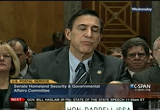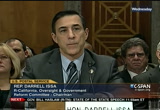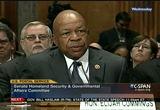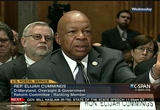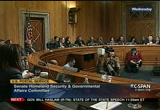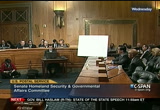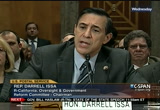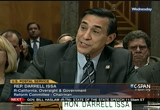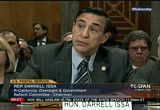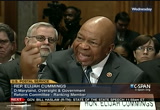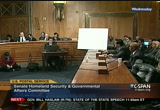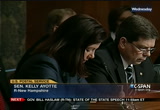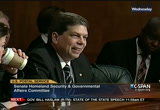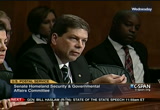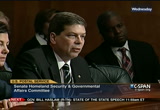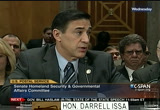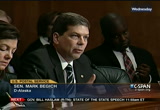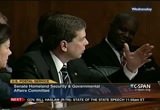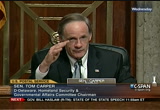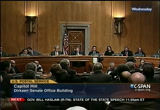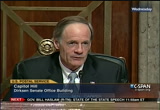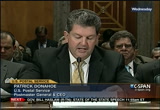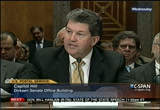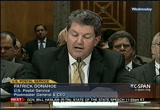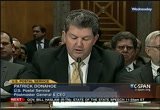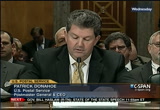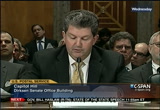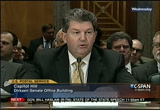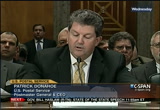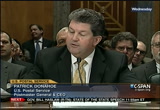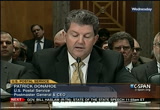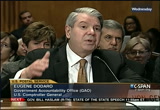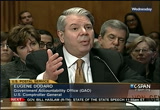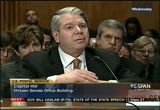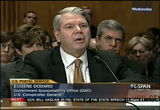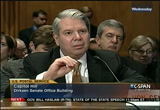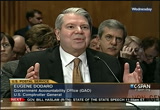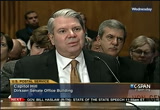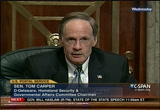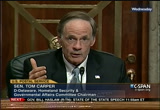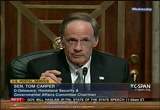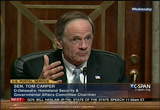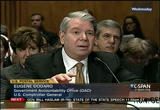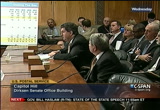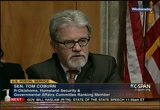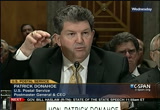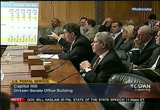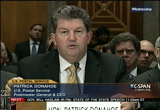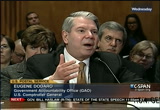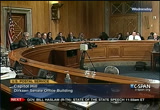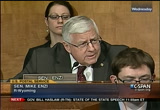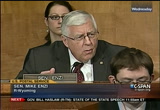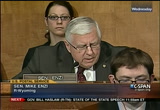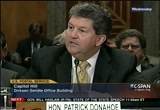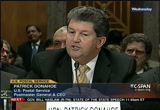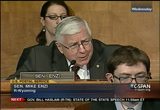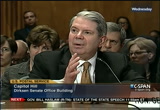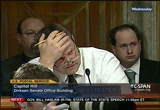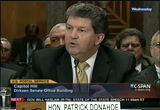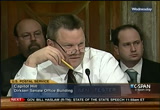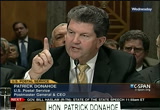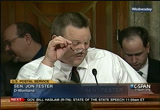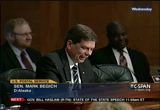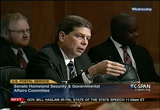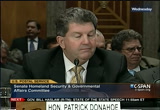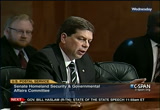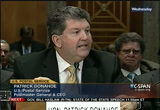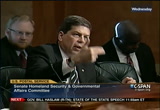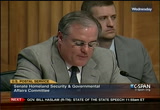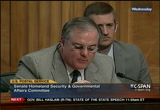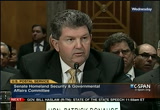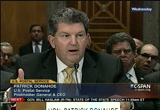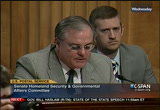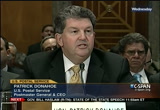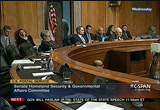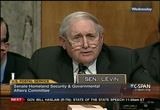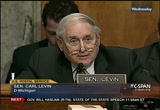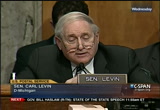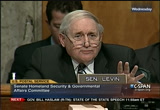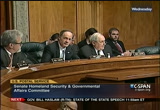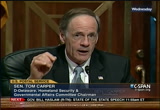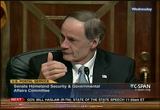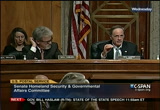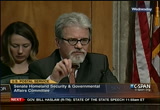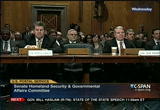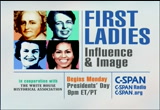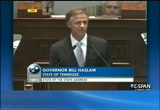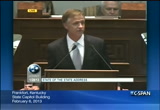tv Future of the Postal Service CSPAN February 16, 2013 10:00am-11:55am EST
10:00 am
unrecognizable to most men and women on the street. >> a new series, first ladies, includes an image. -- influence and image. exploring the lives of women who served as first lady. the women who served as first lady. in a first of its kind project for television, season one begins monday night at 9:00 eastern and pacific. watch the program earlier in the day, live at 2:00 p.m. eastern on c-span. >> now a look at the long-term fiscal health of the u.s. postal service. a hearing was held one week after the postmaster general announced the move to five day letter delivery service. house oversight committee members testify. this is just under two hours.
10:01 am
minutes. >> i have a statement i would like to give. i am going to yield to our friends from the house, chairman isa and our friends, i have enjoyed working with you. last year, had a chance to bear down and try to get to -- we got in the red sun in terms of final solution we've made real progress. and when to forego comments initially and ask our colleagues to just go ahead and pick it up from there. again, thank you for ining us. >> thank you. chairm >> mr. cummings and i came very
10:02 am
close in the last congress to what we thought was a bipartisan, bicameral deal. we start of this congress with the view that with you as team members and cochairs of what we think is a bipartisan, bicameral problem and bipartisan, bicameral solution, we believe we can get there. there. clearly as you can meet today, the subject of five-day delivery is going to be among the most important subjects. a day to emphasize that because i believe in order t get a comprehensive reform, we must first realize free in the realize free in the hands of the postmaster general and away envisioned is a good first step. postmaster has determined going from a less than 50-cent single delivery on a saturday to a
10:03 am
five-day delivery of that mail no matter how small an amount aware for the sunday dissents from a single flat letter will be delivered anywhere in america. but on saturday, a light day, relative to most other countries come and the idea there should be a small premium for flat air, $5.60, sll less than the cost a good hallmark card from cbs term you can have a letter devered. more importantly, the postmaster's proposal will continue to see vital medicines and packages delivered in any other way at any other point in america. the maintenance of universal service, better rightsizing of cost or benefit is the hallmark of what the postmaster is asking this congress to not stand the way it is. probably the postmaster is correct that he is the authority
10:04 am
with the law and maintain service, but the lot number and tended him to do it at a loss. the postmaster had to bear over 15.9 losses last year. this cometely depleted his line of credit. it cost 10 to make cashflows to vircw required and agreed payments of $5.8 billion for the second air in the row. this deferral does not mean eventually those amounts more common due. it is clear alternately to ratepayer a taxpayer will have to pay theover 25 and an accumulated debt of the postmaster or the post office. and i say 25 billion eye towhat statisticians to say it's only 15 alien. this deferral still has to be taken care i've asked you the
10:05 am
eventual medical retirement and other benefits of postal workers. keeping that commitment currently is backed by full faith and credit of the u.s. taxpayer. as i said, the important thing to realize is guaranteeing six-day delivery in america, but doing it at a rate that allows the post office to become solvent again iscritically something the postmaster has to be allowed to do as a preamble to the legislation we vision. australia, canada, finland, spain and as we often know but somemes snicker, sweden have all gone to five-day delivery. rural and urban countries have found that the advantages of electronic mail, with advantages of direct deposit, including social security, which is 100% correct deposit for seniors, the
10:06 am
volume of five male hasgone down and will continue to go down. we in congressften look at loss of jobs is it that thing. i want to close them making a conclusion. had we to years ago from a three or sicko, four years ago dealt with this problem, individuals of the post office who are long-time workers fully able to retire, could have been paid a full year of their pay as an incentive to retire not early, but in fact not later. the cost of a $50,0 buyout of a potential retiree is swiped us and retirees for $1 billion. essentially, in less than a year, you could provide that benefit to every single person eligible to retire and still do
10:07 am
it for less than we lost last year. i'm not suggesting we automatically pay large buyout, but if we can find efficiencies, we can find a way to encourage people to retire without breaking contracts, trust, having people have to go into their golden years are the post office has the right amount of people. e last point as a bargaining point we are so aware of. chairman come you enjoy a great many urban older homes in your state. many of those homes have shoots in their door. everyday a postman comes up and puts flat mail in there, but more and more, the son home see about a piece of medicine or purchases from amazon placed on the stoop, crammed inside the door for some oher way delivered as best a postman can with thereality that that
10:08 am
system, the flat bell system did not envisionhat you do with a box that will be left if you're not home and more and more seniors and young people are out inactive. so the postmaster at his request would like to accelerate over the near future the ability to put in boxes pushed back the older homes in seniors to say what if i have to walk arnd the corner? ever tell you here today that providing a secure box large enough to take purchases and medical supplies in every neighborhood in america should be a goal we in congress pernell, whether it's a new neighborhood portal neighborhood, we find a way to define acceptable boxes to reduce the time necessary to deliver mail, but increased security at medicines delivered to everyoint in america. i believe it to his largest single savings in the system,
10:09 am
five-day delivery and modernization of to the curb delivery are both beneficial it done right. we now have the postmaster was to do it. the other should be a goal to make sure funding is available to provide appropriate secure storage for every american because more and more that the medicines are delivered and that's how purchases are delivered. with that, i'd be happy to take your questions and i yield back. >> mr. chairman, thank you for thoughtful testimony and now i'm pleased to welcome congressman cummings. >> thank you, it's my honor and privilege to be here this morning. i want to say to you, mr. chairman come you're absolutely right. we spent some time in the red zone, but america expects us to
10:10 am
get in the end zone. i do believe and i was listening to you, senator coburn this morning on morning joe. i said to myself, we have to get this done with a reasonable guy like senator coburn and i believe we will. i really do. you know i'm also pleased to be here with my friend and colleague, chairman and he said in the postal service is a vital link that binds our nation together, delivering mail to more than 150 million addresses in operating 32,000 post offices nationwide for postal service connects families, friends and businesses across the vast distances of our great country. last year however the postal service reported losses of approximately $16 million. at last onebut $3 billion in
10:11 am
the most recent quater. it is friday for a 50 alien dollars. it is authorized to borrow from the treasury and continues to this approximately $25 million a day. it also faces a burden not required of any other agency or business in this country. it must be billions of dollars every year to pre-fund health benefits for its retirees. as we all know, this not simply does not add up the postal service needs a new formula for success. last week the postal service announced it intends to end saturday mail delivery and accept packages in august. inmy opinion, this announcement was an unfortunate development and will not solve the postal service's long-term fisal problems. instead, congress needs to pass comprehensive reform legislation
10:12 am
that addresses not only delivery standards come up with a range of reforms needed to fundamentally reengineer the postal service for the next century. to its credit, the senate last year passed comprehensive bipartisan legislation to reform postal operations, including extendg the schedule for retiree payments, overpayments to the postal service made to the federal pension system and providing key tools to access the portal service workforce. everybody agrees we have to resize the workforce. i was pleased the senate included several provisions for my legislation. too many people argue the postal service to be self-sustaining, like a usiness. at the same time arguing it should be banned from competing against the private sector.
10:13 am
i believe we must allow the postal service to expand into new business lines in that bill would've done that. unfortunately, the most significant challenge facing the postal service today is not the delivery or declining mail volume or pre-funding health care to retirees. it's congress' failure to act. although the senate passed a comprehensive and bipartisan bill, the house failed to consider legislation. we cannot solve this problem if we continue to worry. that will only grow more desperate and more dire. there is some reason for hope however that is the ongoin commitment of the members of congress in this very room. the people in this very room can make this happen. over the past 10 months we've come together to discuss potential solutions in a serious
10:14 am
matter and i've been encouraged by many eas of agreement was reached. as a matter of fact, leader pelosi asked mtoday about the status of the bill and i told her that we've got 90% there. we weren't that far. i believe we were on me that the two-point line, mr. chairman and i just can't afford to fumble the ball because when we fumbled the ball, what happens if america loses. i believe we are close. if we would launch a renewed effort as soon as possible, we can have a bipartisan bicameral solution. i predict we can complete the legislation before the end of march for thcurrent appropriations expires. to meet the deadle, we need to do it right now there's no time to waste. finally, let me conclude the issue closest to my heart in this debate.
10:15 am
i believe we have a solemn obligation to honor the dedicated postal service employees who has served this institution for decades. a 60 how to resize the postal service workforce, i urge my colleagues to fight and fight very hard to demonstrate compassion and respect for middle-class american workers and their families. by the way, 21% of them are veterans. 40% are women. many of them single head of useholds. and so mr. chairman, i thank you for holding this hearing and i look forward to recorded during our colleagues in the days to come in with that i yield back. >> thank you. another thoughtful and it struck to comment. thank you at the view. i like the visual here are the two review side-by-side,
10:16 am
democratic republic and, rolling up sleeves to make this happen. a lot of us watched the super bowl and you andi are pulling for the same team. we have a quarterback, where's he from? >> delaware. that's right. as can imagine the ravens, but i didn't want to take it too far. >> at the end of the game, 40 niners headed in the red zone close to the end zone. couldn't get the balmy and sound to me is to make sure we get the ball in the end zone. we bn joined by senator ayotte. delighted you're here today. she brought with her a veteran, a great colleague, one i love to work with, make enzi. they been joined by senator baldwin from wisconsin is a member of our committee.
10:17 am
i have a long statement i ask unanimous consent to be made part of the record. i went to leadoff witnesses instead. dross and pieces out of my prepared testimony. we need the postal service. the event of the stal service if t patient was born. 70 million people don't have a job today there relates in no small part because of the work the postal service does for all of us. 12 years ago when i was a freshman here, tom, i had my staff count the number of letters we got them for about everyone e-mail we receive, we got about 50 miners. today is just the opposite. for every 15 e-mails a day roughly one letter. therein lies the problem. the way to communicate is changed or the postal service is trying to change but that induce
10:18 am
10:19 am
it was not that long ago that we had 800,000 employees or so in the postal service. moving a bit lower, the idea is to right size the enterprise. the other thing the president talked about last night, something they tried to do a lot about, we spend more money for health care in this country than any other on earth. in japan they spend 8% of gdp. the closest major country to us is norway, spending 52% less on
10:20 am
health care that everybody. one of the things the post office is trying to do in this country is trying to figure out how to provide good health care for people, getting better results for the same amount of money. i would be anxious to hear what you have to say on this, mr. postmaster general, to figure out how to make that happen in a way that is not the disadvantage of the employees and retirees. we need to do that. the other thing is the president talked last night about the need to change revenue. this cannot just be about cutting. not just about retire -- not just about cutting services. i heard on the radio the other day and told paul simon song, 50 days to leave your lover. we need 50 ways at the
10:21 am
postmaster general. ways to make some more money. how would you do that? how would we be less of an impediment? a good idea. the last thing i want to say is this -- postal employees are going to a time of great uncertainty. it is not an easy time and has not been an easy time to be a postal employee. most americans feel the postal service does a great job for them. they have a better approval rating than even the doctor and myself, if you can believe it. [laughter] if you are over 85%, i want to drink would you are drinking over here. >> it does seem like a combination of not that high and a lot lower for us. >> i don't know. but at the end of the day i want
10:22 am
postal and i read -- i want postal service employees to know that we are grateful for the work they do and we appreciate that the work of leadership to try to right size this enterprise. this is a problem that can be fixed. this is a challenge that can be met. my goal is to do it sooner. we are in overtime right now and we will get the ball in the end zone. we had five overtimes with one more, this is it and we will get it done. >> i want to thank you for your testimony and your hard work on this issue. i was one of those that failed to vote for the postal reform bill because i thought that it lacked some of the central things required, but i would
10:23 am
want both of you to know that i am firmly committed to getting a compromise bill that will pass both chambers and do it forthright. you have my commitment to do that and i appreciate the testimony. >> i have a question, if i could. if you have a thought, that is fine, i do not want to put you on the spot. the issue of health care, deficit reduction, if we do not figure out how to get better health care results for the same amount of money, the postal service, we have to do more than
10:24 am
amortize the prepayment of health care over 40 years. we will do that. the compromise and we will work out is changing the amortization schedule. the postmaster general will give us ideas with respect to that. amortize the prepaymentthe big y were trying to run health insurance programs and the day -- and the others said they would be willing to run it. better results, frankly, for less money. is that blue sky crazy? >> i do not think it is blue sky. we have all had good guidance from the postmaster on what he would like to do. it is not just in viciousness that is necessary. it is very clear that if the government can transfer out its full faith responsibility for health care on a willing basis, that is in everyone's best interest. i think that we have to be realistic, you cannot transfer
10:25 am
something out, literally, saying that they will turn it over, as general motors did, and still be full faith. that is the one challenge. but i do support the idea of giving -- giving the government out of this health care business. your committee in the senate, a slightly different from our arrangement, has complete control over the federal work force. we have a big chunk, but we do not have it all. the real question on health care is -- is the federal government employee health care system first or second read it -- relative to medicare? this is an important issue that we have to decide as members of the federal government. from the standpoint of we rely on they consider it neutral. from the standpoint of what would happen in the private sector, no company would say that they would pay all of their bills and anything not paid goes
10:26 am
to medicare, they would say that medicare has been fully paid into by the men and women of the post office and we expect them to provide what it would provide for the private sector and we will supplement it. this is what states choose to do, the few that are not fully in the system. that is one of the key questions for your committee, even more than our side, are we going to look at medicare as the primary responsible for all workers, including the postmaster's proposal? if so that changes the calculation of what the ratepayers should be paying for a supplemental medical facility. that is not the way we have looked at it in the past and it is one of the reasons the number we are wrestling with is so big -- so big. >> i have heard the proposals of the postmaster. and i have said to him that i do
10:27 am
not have a problem with that, as long as we are able to get comparable coverage. it is one thing to go out and change things, it is another one when you have on the one hand with the present system 100% and another system you have 75%. he claims that they can do that. if they can do that, that's fine. there are two words that i think we need to concentrate on. effectiveness and efficiency. efficiency. and so if we can effectively, if he can effectively do it cheaper with the same kinds of effects, then so be it. but i think the jury is still out and he believes that it can be done and i am i going to doubt him, but i would like for
10:28 am
him to show me. lastly, let me leave you with this. when you listen to the testimony today, i hope you will concentrate on something you said, which is on the one hand we want the postal system to right size itself, to be effective and efficient, to now adapt to a new world. but at the same time, the question becomes it -- they will mention all the things they can do to bring in money, but i hope they are honest and frank enough to say maybe that congress needs to give them the opportunity to do that. in our committee we had some folks where the postal service would lift up a proposal for how to bring in new revenue and they would say no, no, can do that. not you, not you. [laughter]
10:29 am
a lot of members, you cannot do that, you cannot do that. i know that the postmaster has to get very frustrated. you tell him on the one hand to find new revenue, be effective and efficient, then he goes out there to do at he is told do not the postt, don't close office, don't go against this guy. in some kind of way we need to get past that. i hope that as you listen to the testimony that is the kind of thing we need to do to figure out innovating and the license to get their without being hindered by us. >> i definitely agree. that is good. normally we do not ask questions of our first round, but we will -- do not -- >> we are fine. guy. in some kind of way we need to get past that. i hope that as you listen to the testimony that is the kind of thing we need to do to>> welcom. >> i am one of those guys. one of those guys that said do not and the saturday delivery.
10:30 am
i will tell you why. it has an impact in rome on terror -- rural montana that you may not feel. we do not get mail for five or six days. if we are point to have a mail if we are going to have a solution that works for urban america, it better work for rural america, too. why don't we just turn the contract over to ups or fedex? do away with it? it is in the constitution we have to have a postal service, and i think it has worked well for this country for centuries, and we ought to continue to make it work in the future. it may not be the force it once was, but when it comes to our senior citizens or roll america, this is something that is critical -- or rural america. i'm one of the guys who when they say cut service on saturday says no. we have given other options, and
10:31 am
i've not seen results come from any of those options recommended. the first thing we have done is cut service, and i think that is the worst thing we can do. i am a farmer. the worst thing i can do is give my customers something they do not want. that is exactly what is happening in rural america. i cannot speak for big city areas. >> if i could respond -- first of all, that is something that you and denny agree on. he was a classmate of mine, and he let me know that he would not support any processing changes in montana, period, and he would not vote for my bill under any circumstances before the election, and after the election, he still would not vote for it unless i addressed some of the issues you have. i think you are right -- we have to make sure that rural america is guaranteed a quality of
10:32 am
service, and that is the debate we should have. it should not be the number of processing centers. it should be how many days to get from, if you will, billings to billings. the point at which you are sending it to your neighbor, but it is going to a processing center, how long as he gets to your next-door neighbor. >> i agree with that. the problem is once it is done, it is done. once that processing center in wolf point, montana, is close, and that letter going to someone who does not have a job takes five or six days, it will be the last time the u.s. postal service is used. that is what i'm talking about. >> as you know, ups very wants to maintain the level of service because that hall -- in fact, ups is delivered by united states postal service. we have a partnership in the post office with the private sector that is a win-win, but i assure you that we want to make
10:33 am
sure that there are safeguards so that what is claimed to be a level of service is in fact verified to be a level of service before any processing center can be close, and i think that is what you would need to insist in the bill and that all of us need to make sure we promised in the bill. i know that alaska has the same concern. they, of course, have bypassed mail. i have been up there. they need to maintain a level of service that is unique, and we need to maintain both of them. that is one of the reasons why the right-sizing in urban areas, of not having processing centers that can see each other, postal centers that can see each other, is something that needs to be worked on, and we think we can maintain a level of service in most of the postal areas. >> i look forward to that. i think you touched on the issues, which is that the standard of service delivery has
10:34 am
to be kept competitive. i can tell you that what i see going on in rural america with some of the proposals going out makes it not competitive. that is all. >> let me say this -- senator collins kept these issues at the forefront of all of our discussions. as one who lives in an urban area and has grown up in one, i am very, very sensitive to this. i think when we legislate, we've got to legislate for all america. >> that's right. >> i get it, and i am not anxious to see our postal service -- all due respect to ups, but i think we can do this. i really believe that. being able to do it in a way that satisfies your constituents -- we just got to make our minds up to do it.
10:35 am
>> i will just say this -- the reason i oppose some of the things the postmaster general has recommended is because -- i do not oppose them because i think the postal service needs to be solvent. i think it does need to be solvent. i think that is an admirable goal, and we need to try to achieve it. my concern is that the postal service will not remain competitive in rural america and consequently, it will be gone. that is a real negative for economic development, for our seniors, for everybody. i think we are on the same page, but when i object to some of the things the postmaster general is putting forth that i do not agree with, i will continue to do it. >> i would hope that we understand that the post office can remain competitive with a much lower level of service. the reason we want to maintain the service and guarantee it in this bill is we want rural america to remain competitive.
10:36 am
if they do not get that level of service, it is harder to be a rural american and still compete in the 21st century, so we totally support what you want to achieve. >> anyone else? do you have anything you want to ask of these witnesses? >> just a brief question for both of these witnesses. >> i would ask you to be brief in your responses. >> i am new to this committee, but one of the things i struck me in this report was something that i think i'm hearing from both of you that you would agree on, so i wanted to get your comment on it. the report says if congress does not act soon, the postal service could be forced to implement reforms to allow the post office to sustain -- to be sustainable, that if we do not act soon, the post office could be forced to take more attractive -- drastic actions that could have a disruptive effect on employees
10:37 am
and customers. i see this as many other areas we have around here -- if we do not act soon, the choices get harder. is that true? >> absolutely. >> i agree wholeheartedly -- we've got to act. that is why i said in the beginning, we were so close in the last session, and i think we can get there. we are not that far apart -- we really are not. >> did you have a question of these witnesses? thank you very much, mr. chairman. thank you both for being here. congressman, i thank you for going up to alaska. i know we had a good conversation about that opportunity, and you got to see what we would call a hub, and you saw a real rural alaska. >> know where else do they use a hydrofoil to deliver mail. >> that's right. you have to fly in. you figure out if there is going to be a boat or what to get to
10:38 am
the next location. i also want to thank you for your comment here in this the engagement in regards to bypass mail. alaska is very unique. i think you experienced a long flight, but also, it is not just about mail. it is about food, supplies. without that access and affordable access, we would have situations that people could not afford to live or survive, literally, out there. i appreciate the work you both did, especially toward the end. you could feel the moment -- senator carver was reminding us of this moment where we were so close, but time ran out. i hope we can get back to that because it is so important, understanding the role component, understanding the uniqueness of alaska and getting things to places where you cannot just get in a car and drive down the street to the next walmart, seeing as we have no wal-mart's in rural alaska,
10:39 am
to say the least. i want to continue to work with you on making sure that alaska in its uniqueness of that delivery because that is it -- that is how we get food. timeliness with the post office is critical. you probably heard some examples when you were there. when food is shipped in, sometimes if it is delayed and bypass mail consolidates it and gets it out quicker, that mou -- the food may come out to another system not consolidated, and what happens? it is rotten, spoiled, or can get to the customer in hon. -- or cannot get to the customer in time. you want it usable for at least a couple of days. congressman issa, we had that
10:40 am
one conversation, and you took me up on the challenge, and i thank you for that. >> i just want to reiterate, fixing by the smell is strictly about finding even greater efficiency. you are right, it is on a per- pound basis, the most efficient way on a per-mile basis that one could imagine. our goal with the postmaster is to still make it affordable, to make it the least cost delivery system to those native islands, all kinds of rural parts that even in montana they would call girl -- rural. >> john and i would agree on that. >> i think we can do it, and particularly, we are looking at trying to make sure there is maximum efficiency, maximum choice. as you know, the concern i started with was that i wanted to make sure that we not mix apples and oranges. there's another problem in alaska.
10:41 am
mr. cummings is involved in this on his other committee. that is that we have to ensure affordable air access to some places not available by roads. i want to make sure when we are done we empower the mail to be delivered as efficiently as possible but also ensure the affordable passenger service that has been intertwined with these new carriers. that is a sensitivity i know you have and want to make sure our committee has as we try to find a when-when solution. >> thank you. i do not know what plane you went on, but in alaska, when you get in row 16, that is actually the front of the plane because the other front of the plane is all cargo. that is the unique mix that makes it affordable for passengers and freight. there's nothing like it in alaska. i was in alaska this weekend. one airline had canceled totally service, so we had to quickly switch, and there was only one
10:42 am
airline going in, which was very problematic for food and passengers. i appreciate all your work, both of you. thank you. the first front half its cargo, the back half as passengers. in alaska, cargo is higher value. meaning it is food, supplies. you can get easily kick off a plane if it means bringing out food or bringing in food. for our fish products, it is how it is shipped out. 60% of all wild caught fish in this country comes from alaska. they are high priority, but they move food. literally, when you get rose 16, you should be very excited about that. that means you've got at least 3 feet of legroom, but there is a blank wall -- that is the cargo that is in front, and it is delivered to it. >> thanks. a lot of times when members of the senate testify -- i'm sure
10:43 am
it is true in the house -- it is really a perfunctory deal. they are courteous, they give testimony, and is no questions, and they head out on their way. i want this to be more than perfunctory, and it certainly has been. i love the visual of you sitting side by side, having the chance to work on a really important issue together. before you leave, the last thing i want to do is just quote albert einstein. he said a lot of memorable things. one of the things he said that i found especially memorable inappropriate -- in adversity lies opportunity. we've got plenty of adversity here, but also plenty of opportunity, and we are going to seize that opportunity. we seize the day. carpe diem. with that, carpe diem. we send you on your way. >> thank you. [captioning performed by national captioning institute]
10:44 am
[captions copyright national cable satellite corp. 2013] >> our second panel is comprised entirely of generals. postmaster general and a comptroller general, and neither are in uniform today. i guess they are in the uniforms they wear to work every day. we are happy to join us. our first witness will be patrick donahue, postmaster general and chief executive officer at the postal service. he has spent his entire career at the postal service, beginning as a clerk at the age of 12 -- all right, may be not 12, but a young clerk in his hometown of pittsburgh, spending years in top positions before being appointed.
10:45 am
good man, we enjoyed working with you. glad you could be with us today. our second witness on this panel is jane darrow. i do not know if this puts pressure on him, but write off the top, and we had hundreds of people who have come before us and testified, and fred there, we have people whispering in your ear, and this man just sits there and delivers. you have heard of the term stand and deliver? he sits and delivers. my guess is he will probably do that again today. that said, good luck. we are happy to have you here, and we look forward in having your testimony in helping us get
10:46 am
that ball in the end zone. thank you very much. general data hub -- donahoe. >> thank you, mr. chairman, for calling this hearing to discuss the dire condition of our nation's postal service and for providing detailed for the postal service's proposals. i am glad to be here to discuss these important issues, which are now more urgent than ever. the postal service faces tremendous financial challenges. last year, the postal service recorded a loss of $15.9 billion, a follow-on payment to the treasury of $11.1 billion. the postal service has exhausted its borrowing authority and continues to contend with a serious liquidity crisis. at one point, the postal service had less than 4 cent -- four
10:47 am
days cash on hand to fund services. this is a razor-thin margin. by way of comparison, most private sector companies usually have about two months of cash on hand. the postal service cannot continue on its current path. we are losing $25 million a day. we are weighed down financially by the increasing burden of health-care obligations, and we are projecting ever-increasing financial losses and less financial changes are made to our business model. we have a responsibility to provide an finance universal service to our nation, but we do not have sufficient authority to carry out this responsibility. fortunately, there is an alternative path. if congress enacts legislation and legislative reform, the
10:48 am
postal service can return to profitability. the postal service can return to long-term financial stability, and the postal service can avoid becoming a burden to the american taxpayer. it merely requires that congress provide the postal service with greater flexibility to adapt to a changing marketplace. within our current business model, we have been very aggressive in our effort to reduce costs. since 2006, we have reduced the size of our work force by 193,000 career employees. we reduce our cost base by $15 billion. we are modifying hours at 13,000 post offices, and we have produced 21,000 delivery routes. at the same time, we are striving to retain and generate new revenues. we have seen strong growth in our package goods. this has been fuelled by an
10:49 am
effective marketing and innovation system as well as the continued growth of e-commerce. marketing mail continues to remain a valuable marketing channel, and we expect this part of our business to remain stable for a long time. the business continues to improve its value and has also been relatively stable. fortunately, people like to receive hard copy statements and other business correspondence through the mail, but unfortunately for us, they are electing to pay bills online. the result is we have seen sharp declines in first class mail sent by residential customers, and this is a trend we think will continue to erode postal revenues. despite our best efforts to increase revenue and reduce operating expenses, we lack the flexibility in our business model to close a widening budget gap. this is the core cause of our financial challenges. the postal service must generate roughly $20 billion in
10:50 am
cost reduction and revenue generation by the year 2016 to return to financial stability. we are taking every reasonable and responsible step in our power to strengthen our finances immediately, and indeed, we have been directed by our board of governors to do so. last week, the postal service announced a new six-day package delivery and five-day mail schedule effective the week of august 5, 2013. the anticipated savings from the schedule when fully implemented is approximately $2 billion a year. this assures continued growth in our package business and helps enable e-commerce throughout the u.s. economy. it also reflects the changing realities of america's mailing habits. we would urge congress to eliminate any impediments to our new delivery schedule. market research conducted over the last few years has shown consistently high levels of support from the public for a new delivery schedule. just this morning, cbs news released a poll that said 71% of
10:51 am
the public supports the new delivery schedule. the postal service also conducted a poll this weekend, which showed an 80% support level. although discussion about our delivery schedule gets a lot of attention, it is just one important part of a larger strategy to close our budget gap. it accounts for $2 billion in cost reductions while we are seeking to fill a $20 billion budget gap. during the 112 congress, the senate passed several reforms sought by the postal service. we do believe it can provide a framework for swift action in the current congress. there are several key provisions needed and legislative reforms for our business model. these include requiring the postal service to sponsor its own health care system, since a huge portion of our costs go to health care for retirees, which
10:52 am
will go a long way toward resolving our health-care benefit funding obligations. reforming our business model which would enable us to adapt much more effectively to the competitive marketplace and to changes in our finances. transitioning to a new workforce -- based on a redefined employee of the future, this would include a defined contribution retirement system for employees joining the postal service after 2015 compared to define benefits. we would also like to see a proper calculation of our federal employee bent retirement system surplus to use those funds to pay down the debt of the postal service. allow me to briefly discuss one of the most important opportunities we have to study our financial ship. this results in the way we provide health care to our employees and retirees. there's substantial opportunity for savings -- up to $7 billion was in 2016 alone, for moving to a much more modern, responsive,
10:53 am
customer-focused system. this would involve having the postal service manage its own health care. we would competitively select a large, national provider. by moving away from the federal system, nearly all of our employees and retirees would get the equivalent or better health care coverage and pay less for it. the reduced cost to the postal service would enable a major recalculation of the retiree health benefit obligation, and under some scenarios, might completely eliminate the need to fund the future payments in their entirety. the most important part of the health-care proposal is get to the root cause of cost control. it bends the cost curve permanently downward, and is little value for simply be mortgaging unsustainable and growing obligations. we have got to reduce long-term issues for the long term. as we look at the challenges
10:54 am
facing the postal service, i believe we need to put every option on the table. we need to make decisions, and we need to act. this is fundamentally an issue of adding that the items to get us to a $20 billion total by the year 2016, resolving our health care benefit obligations will not get us there on its own. neither will the delivery schedule changes we have proposed. we have to do every item we have got on our list. the financial problems of the postal service are getting bigger every year. if we have performed the business model several years ago, we would be in much better shape today, but if we delay reform another year or more, we may never get back to another sustainable model, and we would put tremendous pressure on our continued liquidity. we need your help to pass legislation that allows for more revenue generation and efficient and effective cost control and mixed fundamental changes to our business model. without your help, the postal service will soon be running operating deficits in the range of 10 or $15 billion annually.
10:55 am
if congress acts, it can avoid a future scenario in which the postal service requires a taxpayer bailout, which could be in excess of $45 billion by 2017. we must change our business model. time is not on our side. it works against us every day to preserve our mission to provide secure, reliable, affordable, and universal delivery service and to do so without burdening the american taxpayer. the postal service needs to reform to its business model. mr. chairman, let me conclude by thanking members of the committee by recognizing the difficult challenges we face and your willingness to take them on this year. postal service is a tremendous organization with tremendous employees and needs your help. the american people deserve a vital postal service. postal service stands ready to work with this committee to achieve that goal. thank you very much. yourank you, afor
10:56 am
testimony, your leadership, and for your continued service from an early age. >> good morning, mr. chairman, ranking member, members of the committee. it is a pleasure to be here to discuss the postal service's financial condition. the postal service's financial condition has been on our high- risk list for years. and it has been on and off, hasn't it? >> on and off and back on. i put it on, so i knew it was a serious issue. that was back in 2009. it originally was on in 2001 and came off in 2007 after the 2006 reform legislation, but that obviously did not work. that was pre-recession when the mail volumes declined even more. it has been on the list for years. our assessment is the financial
10:57 am
situation is dire, that declining rail volumes have not generated enough revenue is in order for the postal service to meet its expenses and financial obligations. they have been increasing their borrowing and are up to the $15 million debt limit from the treasury department. they are accumulating large, unfunded benefits, liabilities for their programs. if you add the debt and the unfunded liabilities to the benefit programs together, currently, it is $96 billion. as a percentage of revenue, it has grown to 147% of revenues. as the postmaster general mentioned, severe liquidity problems right now, and we have not been able to come up with a financing plan to make financing investments in delivery fleet. many vehicles in the fleet are approaching the end of their
10:58 am
life span. looking ahead, the mail volume for first-class mail, which is their most profitable line, is expected to continue to decline until 2020. these are not the ingredients for a financially stable business model in the future. we have said for years comprehensive legislation is needed. the postal service needs to act, and the congress needs to act. from the standpoint of the postal service, 80% of personnel costs, the need to continue to reduce the size of the work force in inappropriate and compassionate manner. they need to look at the benefits also being paid to employees to make sure they are appropriately sized. there's also excess capacity in their mail processing system. this obviously is a structural
10:59 am
issue that they have. at core, there is a structural issue between their ability to generate revenues with their expenses. they also need, in my opinion, to look at pricing for some of their products where they are losing money. periodicals, for example, and also standard flat mail of catalogs, etc. those items together are not meeting their cost to the tune of about $1 billion last year. they also need to look at new revenue sources. packages are a bright spot in that regard. they have a number of other issues and initiatives under way to generate revenues, but really right now, there's nothing on the horizon that is going to stem the tide for the need to address expenses to meet expected revenues in that time with the exception of some of the package areas. with regard to the congress, there are three things i would point out that congress needs to
11:00 am
deal with in this comprehensive legislative package. first would be to modify the schedule for the prepayment of health care costs. we have noted that the the senate bill would have moved it to a actuarial adjustment, which we think would be helpful is able to financially meet those payments. -- better position than. secondly, i believe the collective bargaining statutes governing the postal service's need to be modified and
11:01 am
modernized. they were set 40 years ago, when the postal service was not in such a competitive position that it is now. it is business model be in question. -- and its business model being questioned. lastly, the congress has to facilitate the ability of the post office to make changes when dealing with market conditions, mail volume changes, and to be able to have the flexibility to adjust their business operations. this is very important because it deals with the service standards that have been set at some of the constraints they have been operating under. the real policy issues that need to be addressed by the congress
11:02 am
is to provide some flexibility in those standards, but to make sure that congress is clear on what standards it wants. the other issue, oftentimes these service standards are a book that in a sort of one size fits all -- looked at in a one size fits all sort of way. this is a really important area. if you go back to the about the you read aost, a researc structural issue built into your expenses on almost a fixed basis and are faced with declining revenues coming from declining mail volumes. that structural issue needs to be dealt with in the legislation. i commend you, mr. chairman,
11:03 am
remember coburn, members of the committee for your commitment. i just put my 2¢ in in addition to that. facewise, you're going to a lot of unintended consequences that nobody needs to deal with. i look forward to continuing to support the committee, and we awill do our part to help as muh as we can. thank you for the opportunity to be here this morning. i look forward to respond to questions. >> i appreciate you being with us and testifying. i appreciate the work that your team does, helping as a lot of ways. -- us in a lot of ways.
11:04 am
we are grateful for that. i am going to go back to something i mentioned earlier. i want to go back to the issue of health care costs. in terms of right sizing the enterprise, looking at the distribution system we have now, a lot of work has been done to rationalize it. if you look at what we passed in the senate, three day delivery, the idea of giving the postal service the option of going from 6-5 in the next few years, there's probably compromise out there that we can seize on to. if you look at the distributions, perhaps a smarter
11:05 am
way, especially in the world -- rural areas. if you look at the reduction in workforce of the postal service , to under 500,000 without layoffs. i think that is real progress not often acknowledged. the 800 pound gorilla in the room is health care. particularly medicare and medicaid. i think it is a real critical point for the postal service going forward. postal employees pay into
11:06 am
medicare. unlike most other employers around the country, they did not get much benefit. my wife, when she reaches 65, and another 20 years -- medicare provides a wraparound, medigap. the second issue, do we have the ability to create a not a larger purchasing pool, but a smaller purchasing pool that is comprised of postal employees and their dependents? to me, it is counterintuitive. the postmaster general here, these folks have these idea to
11:07 am
create a small purchasing pool. the quality just as good, for less money. your reaction to that? >> even if you set aside the pre funding of health care requirements, it is still operating at a deficit situation. this is a big issue that needs to be dealt with. $7 billion that postmaster general mentioned that it would be able to save includes the 5.53 funding amount. -- 5.5 pre-funding amount. we're looking at that issue in response to requests from this committee. we are carefully looking at what effect it would have on postal service employees, what
11:08 am
potential affected would have on the remaining part of the benefit system. we expect to have our report out to you by july. there are no easy answers. a lot of people believe they can drive down the cost, but we are carefully looking at how those things could be handled. >> my time will expire in about a minute. -- products >> securing business first-class mail is critical for us. this past year introduced two for the prize of one. it is giving mailers' the ability to put extra messaging in their mail.
11:09 am
good cash flow from that product. an offspring of direct mail, gives small businesses the opportunity with local customers. we've seen $700 million of growth from that in the last year-and-a-half. package perspective, early bird, you bring the package in the morning, we deliver the same day. that has helped with a 14% increase in package business. we have met proposed, same-day delivery. -- metro post, same-day delivery. >> i am looking at the numbers. revenues were slightly lower this last year, but it or expenses were up 15%. what accounts for that difference? >> the double payment that we
11:10 am
were responsible to make to the pre funding. we were excused from that payment in 2011 but had to make two and 12. >> if you have not had at 11.1 billion payment -- >> are cost would have been relatively stable. taking transportation costs out, trading and, hours working with the union, negotiating agreements, arbitrations were you can bring a person and for 35 thousands of dollars -- $35,000 a year. you understand, like any other organization, we're facing upward pressure from inflation.
11:11 am
that is a net reduction based on a lot of effort from this organization. >> pricing power and the ability to have the flexibility to match price with service, you did not essentially have that now. >> correct. >> i do not see that mentioned in your bullet points of things that need to change. there is a sweet spot for first- class mail. it was mentioned, the ability to have the pricing power. i would love your comment at his on why that is important. >> it is critical. the third point on there is streamline government . when the postal service was
11:12 am
established in 1971, it was established just like with a corporate board of directors. there was a postal regulatory rate commission put into place, with good intentions. i am not talking about against the intention behind that. what we're asking for is to go back in that direction. we have no issue with the regulatory commission. they should be strictly after the fact. this lets us get in the markets we of discussed here today. as long as it is legal for us, we should be pursuing it. we will see this from a price standpoint, let us resolve the cost issues before we go and start pushing prices up. there's a real demand portion in there. >> obviously, in a dynamic
11:13 am
market the post office is operating in now, flexibility on pricing is very important. the current structure sets it up in two tears. one where the have a monopoly or market dominance in that area. then there is competitive pricing for other areas. where they do have flexibility, try to recover their costs. a magic couple of these areas in my opening statement. -- i mentioned a couple of these areas in my opening statement. demand issues at a point of return are you do not want to drive down volume if you overprice in that area, definitely need pricing flexibility to be able to move quickly. what has happened here has been fuelled by changing technology. they need to have an accountability and oversight structure to be able to provide the necessary accountability
11:14 am
pr. >> i do not think anybody has a tougher job than the postmaster general. the post office is in trouble. i congratulate you. there is really 536 postmaster general's. the goal of our reform ought to be that there is one. and that we give you the flexibility to do this service, keep the standards there, have a system that offers the best service at the best price with the best quality. i know a lot of things to have done our controversy. -- a lot of things you've done are controversial. >> i approve that message. >> senator tester. >> i am pleased to be on this
11:15 am
committee. this first hearing affects a lot of wyoming people. everyone in wyoming, and we're one of those rural states to. the post offices are absolutely essential in our rural areas. one of the difficulties we have had, when it was said that post offices were going to be closed. i think it was a wrong process to go through. kagen and explained there were going to be closed. congress got in the way. the best process for any of these people and in rural areas, let them know how much it costs and ask them how they can reduce the cost. it would be surprised at the innovative ideas the people have.
11:16 am
the mail sorting was moved to bigger areas. you talk about what sounds like a great idea, same day delivery. we used to have same-day delivery on the local stuff. they dropped into a separate box that is local. now you drop it all in one box, and it takes a day to go to another town. they started, it takes another day to come back. they get their local mail. the ones that i really hear from are the ones that have presorted mail. if it is presorted, it is ready to go out. but it is loaded on a truck, hold 130 miles -- hold 130 miles, and nothing is done with it.
11:17 am
-- hauled 130 miles, and nothing is done with it. there are a lot of ideas in these rural areas that i think a cut down a lot of the costs. the post office is an essential part of the community of most of these places. solicit their ideas. there will be a lot less problems. i am new to this. the biggest one i am curious about, i know there has been as a drop in mail volume across the country. there are a number of reasons. the popularity of e-mail, the lost art of letter writing.
11:18 am
there are more and more cards being framed because there are so rare. with this drop in total postal volume, has the post office reduce the number of employees to reflect the reduced need? how do employee numbers compare with the volume today? >> let me address a couple of these issues. our people to a tremendous job. they're very productive. in the year 2000, we had 804,000 employees. today we have 495,000. our reduction in the headcount has been continuous. we have done that without
11:19 am
layoffs. in that same time, mail has not dropped off that quickly. our employees are much more productive on a yearly basis. we had 10 years of productivity improvement in a row. people do a great job. we have been very conscious of try to cut costs ahead of time and tried to anticipate the volume loss we have seen. from a service standpoint, there are a number of reasons why we do what we do as far as consolidating and moving mail. it is more efficient. it is more efficient to sort mail three large automated mail forwarding system that we have -- to a large automated mail forwarding system that we have. a lot of it is due to the cost issues we're facing. going forward, your point,
11:20 am
there are some special things we need to do. we need to listen to our customers. we have got 13,000 town hall meetings across the country. talk to our customers, figure out what is the best time to serve them. >> i appreciate the 13,000 town meetings. if the towns could have been better prepared before the town meeting, you might not even had to have the town meetings. the-applied some ideas for cost savings -- they might have applied some ideas for cost savings. i do not want to imply that they're not doing efficient work. we have a great interest in that in our family. >> i want to thank both of you
11:21 am
guys for being here. i appreciate you being here so we can get information. postmaster general, what was your loss for 2012? >> $15.9 billion. >> without the pre funding, 11.1 billion. about $4.8 billion was lost. there has been all sorts of numbers floating around about what saturday delivery is going to save and what it could cost in percentage of mail volume drop. were you looking at that all? >> last time we looked at that, the proposal was to eliminate packages on saturday as well. that has changed. it is one of the areas where
11:22 am
there is the largest opportunity for savings that we have looked at. it would be dependent upon how they would make the transition in terms of realigning their employees to achieve the savings the anticipated, make the appropriate changes, and to see what the type of response would be for mailers and businesses in terms of the changeover time. we also said that change alone is not really going to solve the answer. it is considered included, it needs to be part of a comprehensive banking reforms. >> -- back into reforms. >> do you recall what the figure was? >> $3.1 billion. we pull that down to $2.7 billion. we think it is probably around
11:23 am
$2 billion now because we have to add $630,000,000.600 $30 million back in. -- $630 million back in. >> what have you guys estimated with the drop in mail volume would be? >> we've spoken to a number of customers. we have never been able to ascertain the number -- our best estimate is $100 million in what we call contribution. if you take a look of what is happened on saturday, there have been many people moving away from saturday as a requested delivery date. most of your supermarket circulars are monday through friday.
11:24 am
the choice was, if we had to eliminate because we only had five days' worth of mail delivery, it had to be saturday. >> if you're going to eliminate a day, i would agree with that. didn't the postal service commission in research but said with post office closures and saturday, there would be a drop of over 10.3% in mail volume? >> when we went to the commissioner for ruling an advisory opinion on saturday, i think the number was a total of 600 million versus -- >> that would reflect -- from my perspective, it would be really good to get numbers so we could really take a look at.
11:25 am
everyone wants to help the postal service become more economical. that is the argument that i made to the congressman. i said, if we're doing things to reduce our profitability, we're moving in the wrong direction. >> i visited your state last summer. to talk to our customers about what it would like to see in the post offices. modified hours, keeping mailboxes' available. the other thing the people said , we understand mail is going away. you have to be efficient. our surveys we did this weekend, including rural areas, said the postal service must be efficient. a farmer cannot wait for monday delivery. that is why we come back with
11:26 am
this proposal. we know it is tough taking away saturday delivery. but the financial situation we're faced with -- >> i need numbers of work. are you going to do any more work on this? >> we will look at the cost savings and the trade of issues -- a trade-off issues as far as what the estimates have been on mail volume. >> thank you. the issue is this, we're changing male standards in rural america. with closure, some of the mail processing centers, it will be much longer than that. i will show you the mail. once this goes into effect.
11:27 am
if i have a piece of mail that has to go somewhere and it has to be there at a date time specific, you've got to be competitive or not going to use you. >> and about all kinds of data that shows exactly how much time it is. i would be more than happy to sit down with you -- i have got all kinds of data that shows exactly how much time it is. i would be more than happy to sit down with you. >> can you talk some more about alaska? [laughter] how good is it for us? >> it's the best. someday we will get fda here and have a conversation. you hear about alaska every meeting. thank you for being here. thanks for the work you have done the last period of time, last session.
11:28 am
mr. postmaster, last summer you released a plan. the idea was to keep all post offices open but modify, reduce hours, work that system versus shutting down. can you assure me, us, that post offices and alaska will not be shutdown in rural areas, but you will end up just modifying hours based on a plan to put out last year? >> yes. >> i never want to go further than a positive. you heard my conversation with the two congressman with regards to bypass middle. whip had multiple meetings on this -- mail. we have had multiple meetings on
11:29 am
this. universal service includes getting to everywhere. sometimes it is more expensive. sometimes it is less expensive. is your philosophy still the same? >> we know how important u.s. mail is in the state of alaska and the islands we serve. >> i think you told me this once before, how much of your business is the last piece for u.s. and fedex -- u.s. ps and fedex? >> we have nondisclosure agreements. fedex is our fourth largest customer. ups is now in the top 10. >> i am assuming they want to see this postal reform done as quick as possible. is that a fair statement? >> absolutely.
11:30 am
>> if you're unable to accomplish that -- we are the last mile and some of those rural areas. what will happen? >> there are many other companies that are looking for reliable, affordable mail service. that is the key to resolving this issue. we do not want large companies like citibank corporate america -- or bank of america to seek other ways to get their product delivered. we do a great job, we do it affordably. >> assuming they can find a network is built up as your. >> there is no network near as built up as ours. >> now the economy is getting better, i just read a report that indicated that the treasury had a surplus for the press time in five years -- for the first
11:31 am
time in five years. are you seeing any stabilization, or is it still a deep slide? >> there is three key issues that we look at from a product standpoint. packages are increasing. we're seeing double-digit increase. 17 percent for this month. add mail, direct mail, but has been very stable. we're starting to see that move up with the economy. -- that has been very stable. we're starting to see that move up with the economy. first class bill payments continue to drop. it is people paying bills online. you cannot fight it. it is free.
11:32 am
in the last 10 years, we have lost 60% of that volume, $14 billion for the revenue stream. if we did not have that volume drop-off, we would not worry about refunding health care. >> a couple of those indicators are stabilizing? >> yes. >> thanks for the report of the work you have done. will your work continue, let's assume for a moment the bill passes. will you be part of the process of ensuring that those things put in place that we said a postmaster general said will save x amount of money to honor that? >> we will stay involved. the postal service is on a high
11:33 am
risk list. we will keep it on a high risk list until we are sure the problems have been solved. once legislation is passed, we will not take it off until implementation has successfully been achieved by the postal service. we will stay monitoring that situation, providing regular reports. >> and based on metrics? >> yes. >> i know my time is up. i will have questions for the next panel. >> mr. chairman, i want to thank you for doggedly working a postal reform over the next two years. you passed the postal reform bill. a lot of people said you could not do it. i am assuming that you'd agree that the house had taken up the
11:34 am
senate bill or passed a bill similar to that, you had not have recently made this announcement on saturday delivery, but the bill the senate had passed at provisions in there to make sure that this would not happen for least a couple years -- had provisions in there to make sure that this would not happen for least a couple years. >> we need to do all we can to close the $20 billion gap. the volume is not there. package delivery is what people are looking for. >> i did not want to bring a bit touchy subject. that is, your legal authority for ending saturday delivery. in the appropriation bills over the years, we put provisions in the appropriations bill would basically say you have to deliver on saturdays, or 60 delivery, and there is public
11:35 am
law -- six-day delivery, and there is public law that extends the consolidated appropriations act of 2012. there is a section in their that specifically extends the funding levels of the fiscal year appropriations law under the authority and conditions provided in the previous funding resolution. the cr does not contain language. could you articulate for the committee or legal authority under current law to end saturday delivery? >> through the course of the last couple of years, we have looked at everything we do. our networks, how we deliver, how we provide health care, everything. we a challenge ourselves. i talked to her before as part of my testimony and written
11:36 am
testimony about how we know we can save $7 billion with our own health care plan. we challenge ourselves to figure out from the standpoint of the legality of the 625 day mandates, and it is our interpretation based on what my attorneys have told me that we're clear to move ahead on this project six-five day mandate, and it is our interpretation based on what my attorneys have told me that we're clear to move ahead on this project. we have lost substantial volumes. we have lost 27 percent of our total volume, over 30 percent of first-class volume. every kuster we talked to, business editors, receivers -- customer we talk to, business editors, receivers. i want my medicine in the mail, we're going to do that. we cannot afford a substantial
11:37 am
$14 billion loss that we've seen in first class mail to continue to prop up 60 delivery if it is not needed and there is no demand for it. >> that was not my question. my question is, what is your legal authority. is it you are satisfied that you have legal party. -- a party. i am not sure that you do. -- authority. i am not sure that you do. >> we provided a nine page legal opinion to staff -- to your staff. i would implore you, let's move away from six to five. we need to move ahead and change these delivery schedules. >> in 2011, is that congress must act to allow the postal service to the authority to determine -- >> i agree. and in 2011 and 2010 i also thought we were bound by the
11:38 am
health-care laws i thought we had. we found a way to change the health care provisions to provide better health care to our employees and retirees and reduce the $7 billion cost figure we're paying for pre funding in health care for our employees. we challenged ourselves because we have had to. you do not want the postal service to fail in this country. i have taken responsibility to make sure we're doing everything in our power. i am imploring congress, to not forces back into a 60 window. -- do not force us back into a six-day window. people will adjust. >> what you said, you would
11:39 am
like for the postal service to go from 625 delivery august 1 -- six to five day delivery august 1st. >> august 5. >> if we are still here legislating -- debating that on august 5, we have failed. it is imperative that we act. i want us to get this baby down. we applaud the other stuff. -- have plenty of other stuff. >> thank you, mr. chairman. i think we do have a hope of getting a postal reform bill done again this year. we did it last year without getting the house to agree with it. we have provisions in there that were critically important in terms of reforms.
11:40 am
we have to continue to try to move in that direction. i am not satisfied with your answer to senator pryor's questions. the legal opinion which you sent to the committee, mr. chairman, do we have that legal opinion, can the rest of the members did a copy of it -- get a copy of it? >> i would be happy to have the attorneys come out and spend time with it too. >> you asked me not to act. what difference does it make, whether we prohibit what you say you're going to do or not? apparently you believe you have the legal authority to spite what congress has said, to cancel the six-day. >> what am asking is a congress
11:41 am
would not implement any language that would prohibit us from moving away. >> i am asking, what difference does it make? apparently believe that despite the language, you have the legal authority to cancel the six-day. >> that is our interpretation that we can move. but i am asking is, please to not put language in specifically that says that we cannot do it. i would obey the law. >> you have said congress must act. we did act. despite what is in the law, your lawyer is apparently saying the you can cancel the six-day. >> it is important that we sit down and walk through our interpretation versus the appropriations.
11:42 am
that will clear things up. >> we will look forward to reading the opinion. you have been very responsive in terms of certain information that i have asked relative to the contracts with fedex and ups. we appreciate that. we understand that they have provided to us confidentially. it has got certain information in there that is proprietary. we're not able to act on that. i cannot do anything with it because of the condition under which has given to me. i am handcuffed. i think it is important that there be oversight of those contracts. those are important contracts. fedex, ups are profitable. we deliver a lot of their packages. there is a benefit to us.
11:43 am
we apparently make money in those contracts as well. in terms of the relative benefit, congress has got to have some mechanism to oversee those contracts. i do not know whether the gao do that. -- can do that. >> we're still bound by the same. >> i am not able to handle the material because i cannot do anything with it. i respect proprietary limitations. >> we compete. every contract in this postal service is competing. >> it is also the american way that there be congressional oversight of your contact -- contract. if the gao could give us that
11:44 am
review, it would be reassuring to all of us. >> we would be happy to do that. >> is up to the chair as to they think whether that is something that is appropriate. >> your certainly welcome to that information. >> why don't we talk about this offline. >> my time is up. >> we're going to forgo another round. i want to follow-up on questions
11:45 am
from senator levin. the legal opinion, mr. donahue, i want to make sure that others on the committee and their staffs receive the same documents. the postmaster general has offered to send their legal team up to answer our questions. let's take them up on that. the other thing i want to say in closing, it has been a very helpful hearing. sometimes people hold hearings to put a spotlight on a problem. one of the reasons why dr. coburn and i do hearings is to find out how do we get to yes.
11:46 am
how we resolve this issue. this is eminently solvable. this is one we can fix. i think the dialogue we have had in the first two panels today is in good spirit here with the members of the committee and with the house here. that is all very encouraging. one of several banks the my family uses, when they first started offering service, putting my debit card -- put in a debit card. a message with pop-up. it would say, a neighborhood bank. it was friendly. friendly, but you look it used to. -- you get used to it. i like to say that is our model for delaware.
11:47 am
most of us did not like going through security checks at the airport. the folks at tsa, i am sensing a greater friendliness and .elpfulness brok >> you need to fly more. [laughter] the culture change has started to take place. >> i hope so. delaware, they generally know me. for the most part, they like me. they're friendly and so forth. too often i see the provision service in the post office but i would not describe as friendly and welcoming -- but i would not describe as friendly and welcoming. -- that i would not describe as
11:48 am
friendly and welcoming. i would ask that we focus more on the friendliness, a customer friendliness. as we go to the post office to drop off or packages are buy stamps are order. >> not many people do more oversight than we do. i trust general donna hope to make a good contract with fedex -- donohoe to make a good contract with fedex and ups. there comes a point where we're questioning everything. we need to question the real problems of we're having right now in terms of service, delivery, and price. we need to give the post office the flexibility to do what they can do to prepare to offer that
11:49 am
service in with a puts them back in fiscal health. -- and with the puts them back in the fiscal health. we have great employees -- and that puts them back in fiscal health. we have great employees. until we let somebody run the post office and let us look appropriately at their performance, rather than second- guessing every small item, we're never going to get out of this. i fully support you going to fight it delivered. at the it is an absolute -- five-day delivery. i think it is an absolute must. thank you both for being here. >> thank you. >> thanks for your input today. >> kentucky congressman harold
11:50 am
rogers talks about his efforts to fund the federal government through september 30. "newsmakers" on c-span. tomorrow, live coverage of the climate rally at the national mall. expected speakers include the rhode island senator, and representatives from the sierra club and 350.org., beginning at noon eastern. >> the women themselves in many cases were interested in politics but had no vehicle to express that in their own lives. they were attracted to men who were going to become politically active or were already
11:51 am
politically active. >> each of them i find intriguing, probably half of them in particular precisely because they're so obscure. half of these women probably would be almost totally unrecognizable to most men and women on the street. >> c-span premiere's its new series, first ladies, includes an image. -- influence and image. exploring the lives of the women who served as first lady. a first of its kind project for television. monday night at 9:00 p.m. eastern. >> tennessee governor delivers
11:52 am
the annual state of the state address. from the state capitol in nashville. this is 45 minutes. [applause] >> thank you. thank you. please have a seat. thank you. thanks so much. it is my distinguished honor to present to the honorable bill haslam. >> speaker pro tem johnson, members of the 108th general assembly, justices, constitutional officers, commissioners, france, guests, first lady.rite operas lad
11:53 am
[applause] every day, i feel honored and blessed to have the opportunity to serve as governor of this great state. i appreciate the invitation by the 108th general assembly to report on the state of our state. i will begin with something we all know, tennessee is different. we're known as the volunteer state. we have a history of independence and service. we have been intentional about traps thethe track washington d.c. and other states have fallen into. good things are happening in tennessee. [applause] we're ranked among the lowest
11:54 am
when it comes to state and local tax burden among our citizens, as well as the debt per capita. you're a triple a rated state. our most recent bond sale was done at the lowest interest rate in recorded history. [applause] the unemployment rate continues to fall. family incomes continue to rise. ranks second in cost of living. -- ranks us second in cost of living. we rank fourth and charitable giving. why are we coming out of one of the worst recessions the country has seen in a place of strength? we have a long history of fiscal restraint that crosses party lines. we have been delivered about not spending money we do not have. spending money we do not have.
110 Views
IN COLLECTIONS
CSPAN Television Archive
Television Archive  Television Archive News Search Service
Television Archive News Search Service 
Uploaded by TV Archive on

 Live Music Archive
Live Music Archive Librivox Free Audio
Librivox Free Audio Metropolitan Museum
Metropolitan Museum Cleveland Museum of Art
Cleveland Museum of Art Internet Arcade
Internet Arcade Console Living Room
Console Living Room Books to Borrow
Books to Borrow Open Library
Open Library TV News
TV News Understanding 9/11
Understanding 9/11
